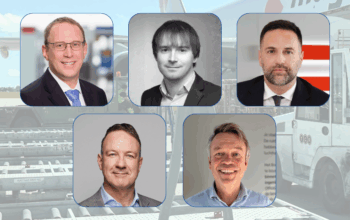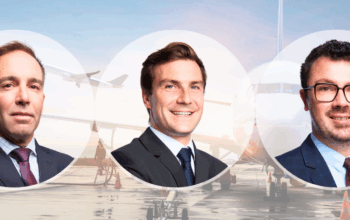
MC of the ACI EUROPE Annual Congress & General Assembly, Kata Cserep shares her major takeaways from the flagship event for Europe’s airports
It was my pleasure to moderate the CEO panel and be this year’s master of ceremonies at the recent ACI EUROPE Annual Congress & General Assembly, held in Athens, Greece.
A week on from the excitement, the following are the themes and reflections that stood out for me, from my unique vantage point, listening to every single session over the two days.
With over 500 attendees, the standout themes emphasized the importance of leveraging innovation and technology to strengthen resilience across European airports. Discussions dived into the fragility of the European aviation ecosystem and emerging risks and threats posed by a dynamic geopolitical landscape. Other headlines were framed by the integration of AI and impact of digital transformation, the just transition to net zero, and the challenges posed by continual regulatory alignment.
The conference began with opening remarks from Yiannis Paraschis, the charismatic CEO of Athens International Airport. This was followed by keynotes from the Greek Minister of Infrastructure and Transport, Christos Dimas and the Greek Minister of Tourism, Olga Kefalogianni. Prominent in the Ministerial addresses was the importance of aviation to the Greek economy, tourism and way of life.
Olivier Jankovec pointed out that the state of play across European airports remains differentiated by market and by size, dynamic and unpredictable. Current performance and future outlooks are being shaped by capacity headwinds, increasing competitive pressures and traffic volatility. With passenger numbers and traffic levels already above 2019 levels overall at the European level, there was a strong sense of optimism about the future. Indeed, the sentiment is that better days lie ahead, despite the current geopolitical dynamics and cyber-security threats facing the world. Nonetheless, regulations continue to tighten on the way to net zero, presenting a significant challenge for European airports, where decarbonisation is anticipated to raise costs to an estimated €1.3 trillion.
Mr Apostolos Tzitzikostas, the European Commissioner for Sustainable Transport and Tourism, gave a heartfelt address highlighting the importance of competitiveness for aviation and that decarbonisation must never be at the expense of this competitiveness. First mover advantage in the commercialisation and upscaling of SAF and investment in cyber-security must be fully enabled as a priority for European aviation. The Sustainable Transport Investment Plan (STIP), a strategic framework to include support for sustainable transport fuels production and distribution, will outline the approach to scale-up and prioritise investment in transport decarbonisation solutions, including those tailored for aviation. The Commissioner spoke with passion and was steadfast in his commitment to support a sustainable European aviation industry, one that is the envy of all sectors and the world.
MAJOR TAKEAWAYS
Core themes ranged from the geopolitical shifts facing the industry today; the need for new, intelligent airport infrastructure and operational resilience across the value chain; cyber-security; the sustainability and decarbonisation challenge; investing in future technologies; and modernising the skies and the way aircraft operate.
Airports worldwide face a new era of geopolitics. Professor Marc De Vos explained how current geopolitical tensions combined with critical issues like climate change and rapid technological breakthroughs are creating seismic shifts for air transport. European air connectivity must not be taken for granted – as capacity limits both in the air and on the ground and the need to decarbonise are threatening this connectivity. Decisive steps supported by feasible and practical action must keep European airports operating responsibly and with social licence.
The transformation of European airports and the airspace connecting them is paramount and a vital pillar to their long-term resilience, success and sustainability. Foresight, innovation and technology must merge to unlock commercial advantage, revolutionise operational efficiency, elevate the passenger experience, and catalyse economic growth in a changing climate.
Our hosts, Athens International Airport (AIA), set out ambitious plans, framed by a bold, well-established roadmap to a net zero future. Yiannis praised the efforts of his team at AIA to decarbonise. He reaffirmed how AIA was amongst the first airports to join ACI’s Airport Carbon Accreditation Programme, when launched in 2009. AIA quickly progressed through the various levels of accreditation, investing in new technology to reduce its operational carbon footprint and finally offsetting its residual emissions to become the first carbon neutral airport in Greece and the 25th in Europe. Investment in a comprehensive energy efficiency programme, ICT infrastructure upgrades, vehicle fleet transition to alternative fuels and electric, and development of a large-scale behind the meter 8 MWp solar generating system, the largest unified PV installation at an airport at the time all delivered significant GHG emissions reductions.
In 2019, AIA announced its Route 2025 initiative, a commitment to reach net zero carbon emissions by 2025, 25-years earlier than the industry’s target of 2050. The Route 2025 Roadmap, which describes the major changes needed in airport infrastructure to fully decarbonise its operations. Impressively, AIA is investing in additional behind the meter solar capacity to meet all its future energy needs. To be completed in two phases, phase one involves the installation of a new 16 MWp solar photovoltaic system (operational since 2023). Phase two will connect a further 45 MWp of solar generating capacity to the grid this year, as well as energy storage infrastructure. This is expected to make the airport fully self-sufficient in terms of electricity supply, driving down AIA’s GHG emissions by around 90%.
In summary, as European airports navigate an exciting new chapter, growth, new business models and technology adoption alone are not enough. Sustainability, both environmentally and financially is a must. The industry’s commitment to net zero emissions by 2050 in tandem with being cyber smart and digitally savvy will be a driving force behind the transformation of European airports as they meet the future needs of airlines, passengers and communities in which they serve.
Kata leads the PA global Aviation team and has close to 20 years of commercial aviation experience, with a focus on airport and airline strategies, M&A and decarbonisation. Kata brings credibility as an aviation industry leader having delivered a wide variety of high value projects, including airline diagnostics, airport business plan forecasts, sustainability road maps and investment advice to global infra funds and private equity.
Working across the aviation ecosystem affords Kata a unique perspective which delivers value to a variety of stakeholders, ranging from policymakers to investors to airlines and airport managements and industry associations. Kata and her colleagues at PA are Bringing Ingenuity to Life and helping to make aviation more agile, more resilient and more sustainable, helping to ensure that benefits are maximised while negative impacts are continuously reduced.
Kata holds a Masters in Economics from the University of Cambridge, a Diploma in Responsible Tourism from Leeds Becket University and has previously been recognised by Airline Economics Journal as one of the aviation industry’s Top 40 under 40.



